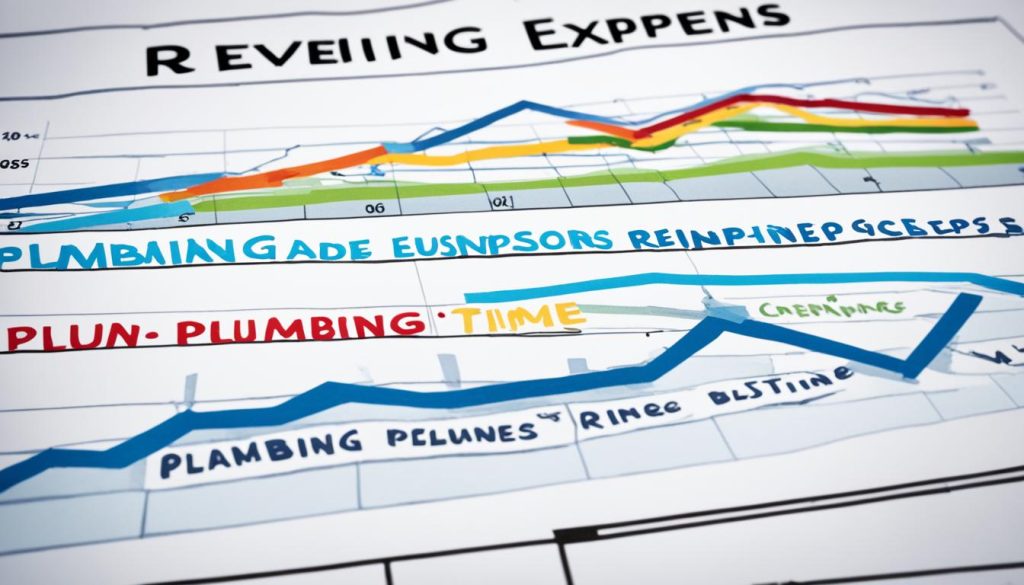Valuing Your Plumbing Business: Key Steps
Did you know that valuing a plumbing business is crucial for planning its future? Whether you’re looking to sell, grow, or invest, understanding the true worth of your plumbing business is essential. But how do you determine its value? Let’s explore the key steps involved in valuing a plumbing business and discover the factors that can impact its worth.
Key Takeaways:
- Valuing a plumbing business is important for decision-making regarding selling, growing, or investing.
- Common approaches to valuing a plumbing business include the book value, market value, and multiple of earnings.
- Factors such as licensing, experience of the plumbing crew, and owner involvement can impact the valuation.
- Clean financial records, an in-house estimator, and minimizing owner involvement can help maximize the value of a plumbing business.
- Working with a professional business appraiser or valuation expert is recommended for accuracy and obtaining the highest possible value.
Understanding the Business Valuation Process
When it comes to determining the worth of your plumbing business, a comprehensive analysis of its financials and operations is essential. This business valuation process involves evaluating various factors to arrive at an accurate appraisal. Let’s explore the key steps involved in evaluating the value of a plumbing business.
Calculating Seller’s Discretionary Earnings (SDE)
The first step in the valuation process is calculating the seller’s discretionary earnings (SDE) for multiple years. SDE is a measure of the business’s true earnings potential and takes into account factors such as the owner’s compensation and other discretionary expenses. To calculate the SDE, you need to analyze the financial statements and make adjustments for rent, personal vehicles, and family members on the payroll.
Applying a Valuation Multiple
Once the SDE has been determined, the next step is to apply a valuation multiple. This multiple represents how much a buyer is willing to pay for each dollar of the plumbing business’s earnings. The valuation multiple is typically based on industry benchmarks and recent market trends. By multiplying the SDE by the valuation multiple, you can arrive at an estimated value for your plumbing business.
There are several key factors that can influence the valuation multiple, including recurring revenue, customer base, reputation, and online presence. Plumbing businesses with strong recurring revenue streams and a loyal customer base are often seen as more valuable. A positive reputation and a robust online presence can also contribute to a higher valuation.
The Importance of Professional Appraisal
It’s crucial to work with a professional business appraiser or valuation expert to ensure an accurate assessment of your plumbing business’s worth. These professionals have the knowledge and experience to analyze the financials, consider industry-specific factors, and provide a realistic valuation. Their expertise can help you obtain the highest possible value for your plumbing business when it comes time to sell or seek investment.
Using the Market Approach to Value a Plumbing Business
When determining the value of a plumbing business, one widely used valuation method is the market approach. This approach involves analyzing recent sales of similar plumbing businesses in the open market and applying valuation multiples to determine the value.
The market approach takes into account various financial metrics, such as seller’s discretionary earnings (SDE), EBITDA, or revenue multiples. These valuation multiples are derived from comparable sales reports and consider factors like the size, location, recurring revenue, customer base, and reputation of the business.
By using the market approach, you gain valuable insights into the fair market value of your plumbing business based on recent transactions within the industry. It helps you understand how your business compares to others that have been sold, taking into account the specific characteristics and competitive landscape of your plumbing business.
To illustrate the concept further, here is a table showcasing the application of the market approach in valuing a plumbing business:
| Comparable Plumbing Business | SDE Multiple | Location | Recurring Revenue | Customer Base | Reputation |
|---|---|---|---|---|---|
| ABC Plumbing | 3.5 | Toronto, ON | $500,000 | 500 | Excellent |
| XYZ Plumbing | 4.2 | Vancouver, BC | $700,000 | 800 | Good |
| 123 Plumbing | 3.2 | Calgary, AB | $450,000 | 400 | Fair |
In the table above, you can see three comparable plumbing businesses that have recently been sold. Each business has a different SDE multiple based on its unique characteristics. Using this data, you can assess how your plumbing business aligns with these comparables and apply an appropriate valuation multiple to determine its value.
When utilizing the market approach, it is important to consider factors such as location, customer base, recurring revenue, and reputation. By evaluating these elements and comparing them to recent sales, you gain a better understanding of your plumbing business’s worth.
Using the Income Approach to Value a Plumbing Business
The income approach is a commonly used method to determine the value of a plumbing business. This approach focuses on assessing the cash flow potential of the business and takes into account the associated risks. By evaluating the cash flow, a prospective buyer can determine the return on investment and make informed decisions.
There are different methods within the income approach that can be used to value a plumbing business. Two of the most common methods are the capitalization of cash flow and discounted cash flow.
The capitalization of cash flow method involves dividing the projected earnings of the business by a capitalization rate. The capitalization rate represents the expected rate of return that an investor would require. By determining the capitalization rate and projecting the future earnings, the value of the business can be calculated.
The discounted cash flow method, on the other hand, takes into account the time value of money. It projects the future earnings of the business over a specific period and applies a discount rate to account for the risk and time horizon. By discounting the future cash flows, the present value of the business can be determined.
When using the income approach to value a plumbing business, several factors should be considered. Location plays a significant role in determining the potential cash flow as it influences the demand for plumbing services. Financial performance and the stability of the business are also essential factors to assess its cash flow potential. Furthermore, the strength of supplier relationships and the level of competition in the market can impact the valuation.
Working with a valuation expert can be highly beneficial in using the income approach to value your plumbing business. They can help assess the cash flow potential accurately, identify the associated risks, and determine the most suitable method for your specific business.
| Factors | Impact on Valuation |
|---|---|
| Location | Determines potential cash flow and demand for services |
| Financial Performance | Indicates the stability and profitability of the business |
| Supplier Relationships | Affects the reliability of the supply chain and cost management |
| Competition | Influences pricing strategies and market share |
Factors Impacting the Value of a Plumbing Business
When it comes to evaluating the value of a plumbing business, there are several important factors to consider. These factors can greatly impact the overall worth of the business and play a crucial role in maximizing its price.
One of the key factors affecting the value of a plumbing business is recurring revenue. Businesses that have a strong and consistent customer base, with recurring revenue streams, tend to command higher multiples. This is because predictable income streams provide potential buyers with a sense of stability and confidence in future earnings.
The reputation and online presence of a plumbing business are also significant factors that influence its value. A positive reputation built on quality workmanship and excellent customer service can greatly enhance the perceived value of the business. Similarly, a strong online presence, including positive customer reviews and a well-designed website, can contribute to customer trust and brand recognition, thereby increasing the value of the business.
Location is another crucial factor in determining the value of a plumbing business. Businesses situated in high-demand residential areas or in regions experiencing growth and development are often deemed more valuable. The location can significantly impact the potential customer base and the business’s accessibility to clients, thereby influencing its overall worth.
Financial performance and supplier relationships are also important indicators of a plumbing business’s value. A stable financial track record and well-established supplier relationships demonstrate the business’s stability and profitability. These factors provide reassurance to potential buyers and contribute to a higher valuation.
Moreover, the level of competition within the industry can affect the value of a plumbing business. Companies that differentiate themselves, innovate, and have multiple revenue streams are often deemed more valuable. They demonstrate resilience against market fluctuations and have a competitive edge over their rivals.
To maximize the price of your plumbing business, it is crucial to focus on these factors. Clean financial records, hiring an in-house estimator, and reducing owner involvement in day-to-day operations can all contribute to increasing the overall value of your business.
- Investing Wisely: How Windows & Doors in Boost Property Value and Financial Health - April 24, 2025
- The Financial Impact of Personal Injuries: Why Legal Help Matters for Business Owners - April 16, 2025
- The Hidden Financial Costs of Domestic Assault: What Business Owners Need to Know - April 16, 2025













